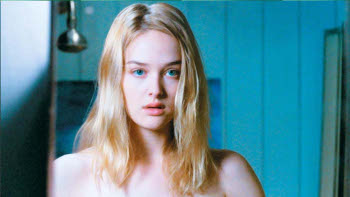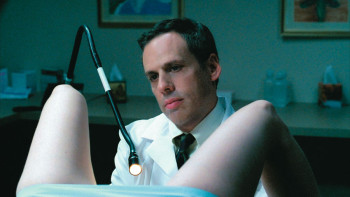(As much as I’d love for you to enter blindly and leave scarred, one cannot talk around the premise of Teeth, so heed the Spoiler’s Creed. And beware of dirty talk. And bad wordplay.)
Teeth
 Dawn is afraid of her body, but it’s the boys who are in trouble.
Dawn is afraid of her body, but it’s the boys who are in trouble.
She is a star in a local abstinence program – a heartfelt, eloquent advocate for preserving virginity – but she’s not immune to the temptations of the flesh. One night, while fantasizing about the cute boy she just met, her hand creeps down … but she can’t do it.
Perhaps she knows instinctively what a handful of boys and men are about to discover in Teeth: She has a bloodthirsty vagina.
It starts with that cute boy, who has also pledged to remain celibate until marriage but forces himself on her at the lake, exclaiming that he hasn’t even jerked off since Easter. His phallus finds itself suddenly detached, and the sound design revels in an ejaculation of blood, with voluminous spurts mimicking orgasmic contractions.
And so on and so forth, as Dawn’s sexual parts extract a few inches of flesh for each guy who wrongs her. The movie traces Dawn’s journey from confusion and horror to control and, finally, pleasure drawn from her new role as a sexual avenger.
As the movie progresses, it becomes more anatomically explicit, reinforcing the audience’s empathy with Dawn. When it happens the first time, she can barely look at the damage she’s inflicted, and all we get is a quick shot of a severed penis. The third time, we stare at the boy’s groin as he desperately tries to stop the bleeding. Standing naked before a mirror, the previously shy Dawn admires her breasts.
The text is easily read as a narrative of female empowerment, of a young woman’s dawning understanding (hence, the name) and use of her potency. But Teeth was written and directed by Mitchell Lichtenstein, and in the hands of a man, there’s a vein of gynophobia and misogyny inherent in the material; while vagina dentata in this context apparently punishes only men who violate, it has a long history rooted in a male fear of female sexuality.
A critical element of vagina dentata folklore is the conquering of it. Stephen J. Ducat summarizes one tale in The Wimp Factor: Gender Gaps, Holy Wars, and the Politics of Anxious Masculinity:
“In the mythology of some North American Indians, there is a story of the Terrible Mother whose vagina is inhabited by a meat-eating fish. To make her into a woman, the hero must overpower the Terrible Mother and knock the teeth out of her vagina.”
And even when vagina dentata is not explicit, dentistry can be a metaphor for stripping women of power. As Ducat writes:
“Fantasies of headless women, and the vagina dentata myths […], are manifestations of male gender and sexual anxieties that are linked in complex ways. In many cultures and historical periods, symbolic equations have been drawn […] between heads and genitals. The vagina dentata is itself a mouth, aberrantly but meaningfully located.”
To state the obvious: A vagina with teeth is not much different from the potential for violence inherent in fellatio.
I’m emphasizing this background because it illustrates the lasting resonance of vagina dentata as an expression of male dread, and shows how difficult it is to lop the toothèd vagina from its origins.
Lichtenstein doesn’t even try, as he shows Dawn researching her condition and understanding that she is one in a long line of dangerous women. One character in Teeth has an imperfect understanding of these stories and thinks that to be the hero, he must fuck Dawn rather than de-fang her. He pays for his ignorance.
Teeth does differ from the folklore in critical ways. The movie is, essentially, half the story, and that has the effect of reversing its allegiance. Because the movie is told from the female perspective, and because the men are such deserving pricks, the audience is given license to derive satisfaction from their emasculation.
Those twists aren’t enough to distract from the reality that Lichtenstein, writing and directing his first feature, paints with a broad brush, and the storyline is awfully thin. The climax is fated from the opening scene, and if it has any tension at all, it’s the anticipation of comeuppance, and a bit of giddy excitement at how disgusting it will be.
It is revolting, with a final visual gag that completes the main villain’s humiliation in a way that is shamefully right. A pierced cock has never looked so pathetic.
 For that and a handful of other pitch-perfect gross-out flourishes, Lichtenstein deserves a lot of credit as a filmmaker.
For that and a handful of other pitch-perfect gross-out flourishes, Lichtenstein deserves a lot of credit as a filmmaker.
He also has a deft touch with tone. Despite its subject matter and the shock of dismembered members, Teeth is surprisingly enjoyable, able to balance horror with a comedic eye for detail. The film moves quickly, and it’s nearly breezy.
Part of its charm is that the director and his team, while hardly restrained, are judicious and economical with their gore. In the aftermath of the doctor’s digital encounter with Dawn, we spot four fingers on the floor, and while that doesn’t convey important information, it is relevant, emphasizing his molestation.
Yet there’s something dispiriting about a movie that treats sexual violence so lightly, and something disappointing in a film that seems so disinterested in characters that should be fascinating. For all the little things it nails, it misses the bigger picture, and its opportunity to be a richer, more-resonant movie.
Jess Weixler, as Dawn, looks like a cross between Uma Thurman and Juliette Lewis and hits the notes her arc requires: earnest in her chastity, frightened by her newly discovered choppers, and then pleased with herself once she figures out how to use them properly. But there’s not much to her as a character.
And I don’t think we’re supposed to take this violence against Dawn too seriously. Each assailant gets his just desert, of course, but more importantly, we take our cue from the victim, who seems more traumatized by the carnage she causes than what’s been done to her. Well, he raped me, but then my vagina chomped his dick off! I’ve never seen so much blood! And the screaming!
I’m not asking for a complex psychological portrait, but there’s a lot more meat here than Lichtenstein chose to bite off. (Boo! Hiss!) There’s no anger in Dawn, and her casual acceptance of violation feels incongruous with the way she cherished her “purity.” (It also seems incongruous with being a sentient human being.) I wanted to see the conflict in her, the fight among her ideals, her budding sexual desire, her rage, and her capacity to castrate, all contained in that mysterious body.
Teeth is happy to skate by on its premise instead, and while it’s a tricky one executed cleverly and with wit, it’s fundamentally simple-minded, facile, and cynical. The movie suggests that Dawn and every other girl in the world are essentially at the mercy of manhood. She’s fingered as a child by her stepbrother-to-be. At the lake, she’s raped by her new boyfriend. She’s sexually assaulted by the doctor. And yet another guy manipulates and drugs her to get in her pants, and brags about it on the phone while he’s having sex with her. A girl’s life, the movie argues, is nothing but a litany of lechers.
As for empowerment, Teeth undercuts itself, because while Dawn is equipped to dispense poetic justice, most women don’t have any effective means to defend themselves.
Yes, we have laws against everything that’s done to Dawn. But they (and you) don’t have the teeth that she does.


Ha, Ha, Ha! Thanks for the biting commentary on a movie I hadn’t heard of before. Not sure if I should add it to my list or not though it might make me laugh or re-confirm all my adolescent fears. Is “Teeth” the sequel to the “Vagina Monologues”? Seems like a nice double feature that could scar a person, literally, for life. I eagerly await the drunken commentary on this one!